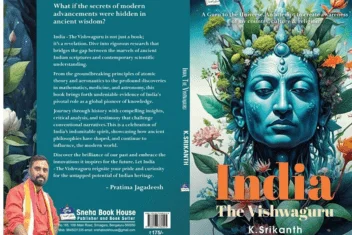At Embitel Technologies, we believe our strength lies not just in our innovation and expertise, but in the unique individuals who bring passion, purpose, and creativity into everything they do. Today, we are incredibly proud to spotlight one such inspiring teammate - Srikanth K, Associate Finance Manager at Embitel, who has recently launched his thought-provoking new book, India – The Vishwaguru.
With over 18 years of experience in the IT industry, Srikanth’s professional journey is one of dedication and depth. But beyond the numbers and spreadsheets, he is also a Kannada author, a certified yoga teacher, and a member of a Guinness World Record-holding team.
Let us explore more about this interesting book from the author himself.

1. What's your book about, and what inspired you to write it?
India - The Vishwaguru celebrates India’s profound contributions to science, technology, and ancient wisdom. It aims to rediscover the timeless knowledge embedded in our culture and how it remains relevant in today’s world. The inspiration came from a desire to reignite pride in India’s heritage and demonstrate its potential to lead the world as a beacon of knowledge and peace.
2. Can you share an example where something from your work life inspired a scene or idea in your book?
In the corporate world, we often rely on data-driven decisions. This reminded me of how our ancient texts like the Arthashastra and Vedas provided systematic approaches to governance, strategy, and problem-solving. The parallels between ancient wisdom and modern practices deeply influenced the themes in my book.
3. What's one piece of advice you wish you'd had when you first started writing your book?
Writing is as much about persistence as it is about creativity. I wish someone had told me early on that it's okay to write imperfect drafts as long as you keep moving forward.
4. Did you ever have trouble switching from a logical, work mindset to a more creative one? How did you handle it?
Yes, but I found that focusing on India’s rich culture and history—topics I’m passionate about—helped me make the transition seamlessly. Reflecting on stories and lessons from our heritage provided the creative spark I needed.
5. What was your daily routine like when writing your book, and how did you stay focused while balancing work?
I dedicated late nights during weekends to writing, as it’s the quietest and most focused part of the day. Balancing work and writing required discipline, but the thought of sharing India’s greatness kept me motivated.
6. What advice would you give to someone in the corporate world who wants to write a book someday?
Start with a clear vision and outline and use your professional discipline to stay consistent. Treat writing like a project with goals and deadlines, and don’t hesitate to draw inspiration from your work life.
7. How has writing a book affected your work life? Have you learned anything new about yourself?
Writing has taught me patience, creativity, and the importance of perseverance. It also helped me appreciate the balance between logic and imagination, skills that now influence my professional decisions.
8. Do you feel that writing a book is a different kind of achievement compared to your work achievements?
Absolutely. Professional achievements are often collaborative, while writing a book is deeply personal. It’s a testament to individual passion and dedication.
9. Is this your one-time writing project, or might you combine your corporate experience with writing in the future?
While India - The Vishwaguru focuses on cultural heritage, I’m open to exploring themes like leadership, innovation, or even a memoir blending corporate insights with personal growth.
10. How did your coworkers or peers react to your book?
Many were curious and excited about the concept. It sparked conversations about India’s potential and how its heritage can inspire modern solutions.
11. If you could choose any famous person to read your book, who would it be and why?
I’d choose Prime Minister Narendra Modi for his dedication to showcasing India’s greatness to the world. His insights would greatly resonate with the themes of the book.
12. What inspired you to explore India's ancient wisdom while working in a corporate world focused on innovation and technology?
I realized that many modern principles stem from our ancient texts, such as holistic thinking and sustainability. These timeless lessons can offer solutions to the challenges we face in today’s fast-paced world.
13. Has ancient Indian wisdom helped you in the corporate world? If so, how?
Yes, the concept of Nishkama Karma (selfless action) taught me to focus on efforts rather than outcomes, helping me stay grounded and resilient in high-pressure environments.
14. How can India regain its role as the Vishwaguru in today’s globalized world?
By promoting its ancient wisdom in science, sustainability, and holistic living while integrating it with modern innovation. Education reforms, global outreach, and showcasing our heritage can pave the way.
15. Can you share an example where ancient teachings helped you make a decision?
In a high-stakes decision, the Bhagavad Gita’s lesson on detachment from results guided me to act with clarity and confidence, irrespective of the outcome.
16. What’s your favourite way to integrate ancient teachings into your daily routine?
Practicing mindfulness through yoga and meditation helps me stay centered while aligning with ancient Indian principles.
17. Do you think today’s tech giants could learn from India’s ancient wisdom?
Certainly. Concepts like sustainable development, holistic thinking, and ethical leadership are embedded in our ancient texts and can address modern-day challenges.
18. What’s your favourite part of Indian cultural heritage that deserves more attention?
The interconnectedness of science and spirituality in our texts, such as the Vedas and Upanishads, which showcase a balanced approach to life.
19. Was it harder to edit your book or your Excel sheets?
Editing the book was harder! It involved refining ideas, emotions, and perspectives, unlike the structured logic of Excel sheets.
Conversations like these remind us of the incredible stories within our own walls. Here’s to many more milestones, and to the stories that continue to inspire us all.


